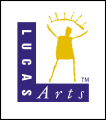Difference between revisions of "Lucasfilm Games"
From Sega Retro
m (Text replacement - "Category:Third-party development companies" to "") |
|||
| (10 intermediate revisions by 2 users not shown) | |||
| Line 1: | Line 1: | ||
| − | {{ | + | {{CompanyBob |
| − | | logo= | + | | logo=LucasfilmGames logo 2021.png |
| − | |||
| founded=1982-05 | | founded=1982-05 | ||
| defunct= | | defunct= | ||
| Line 7: | Line 6: | ||
| mergedwith= | | mergedwith= | ||
| mergedinto=The Walt Disney Company (2012) | | mergedinto=The Walt Disney Company (2012) | ||
| − | | headquarters=San Francisco, California, | + | | headquarters=P.O. Box 10307, San Rafael, California, 10307, United States{{magref|egrn|8|31}}{{fileref|SummerCES1991 Directory.pdf|page=175}} |
| + | | headquarters2=San Francisco, California, United States | ||
}} | }} | ||
| + | '''Lucasfilm Games''' is a subsidiary of Lucasfilm which specialises in video game licensing and until 2013, video game development. Between 1990 and 2021 it was known as '''LucasArts Entertainment Company LLC''' (trading as '''LucasArts'''). | ||
| − | + | Lucasfilm Games started publishing games in the late 1980s, becoming one of the world's leading adventure game publishers along with [[Sierra Entertainment]], a trend which continued until the 1998 release of ''Grim Fandango'', the first adventure game the company failed to make a profit on (despite positive reviews). However, being linked to Lucasfilm, the company has access to big franchises such as ''Star Wars'' and ''Indiana Jones'', which has kept it afloat despite the downfall of the adventure genre. | |
| − | + | In 2013, new owners [[The Walt Disney Company]] ceased all internal video game development at LucasArts and laid off most of its staff, reducing the company into a video game licensing arm. The license for core ''Star Wars'' games was given to [[Electronic Arts]]. In 2021 the company reverted to its previous name of Lucasfilm Games{{ref|https://web.archive.org/web/20240223143253/https://www.starwars.com/news/lucasfilm-games}}. | |
| − | |||
| − | In 2013, Disney ceased all internal video game development at LucasArts and laid off most of its staff, reducing the company into a video game licensing arm. The license for core ''Star Wars'' games was given to [[Electronic Arts]]. | ||
| − | |||
| − | |||
==Softography== | ==Softography== | ||
| − | {{ | + | {{CompanyHistoryAll|Lucasfilm Games|LucasArts}} |
| − | |||
| − | |||
| − | |||
| − | |||
| − | |||
| − | |||
| − | |||
| − | |||
| − | === | + | ==Gallery== |
| − | + | <gallery> | |
| − | + | LucasFilmGames logo.png|Lucasfilm Games logo (1982-1992) | |
| − | + | LucasArts logo 1992.svg|LucasArts logo (1992-2005) | |
| + | LucasArts Logo.svg|LucasArts logo (2005-2013) | ||
| + | LucasfilmGames logo 2021.png|Lucasfilm Games logo (2021-) | ||
| + | </gallery> | ||
| − | == | + | ==References== |
| − | + | {{NECRetro}} | |
| − | + | <references /> | |
| − | |||
| − | |||
| − | |||
| − | |||
| − | |||
| − | |||
| − | |||
| − | |||
| − | |||
| − | |||
| − | |||
| − | |||
| − | |||
| − | }} | ||
Latest revision as of 05:51, 9 July 2024

| ||||
| Lucasfilm Games | ||||
|---|---|---|---|---|
| Founded: 1982-05 | ||||
| T-series code: T-230 | ||||
| Merged into: The Walt Disney Company (2012) | ||||
Headquarters:
|
Lucasfilm Games is a subsidiary of Lucasfilm which specialises in video game licensing and until 2013, video game development. Between 1990 and 2021 it was known as LucasArts Entertainment Company LLC (trading as LucasArts).
Lucasfilm Games started publishing games in the late 1980s, becoming one of the world's leading adventure game publishers along with Sierra Entertainment, a trend which continued until the 1998 release of Grim Fandango, the first adventure game the company failed to make a profit on (despite positive reviews). However, being linked to Lucasfilm, the company has access to big franchises such as Star Wars and Indiana Jones, which has kept it afloat despite the downfall of the adventure genre.
In 2013, new owners The Walt Disney Company ceased all internal video game development at LucasArts and laid off most of its staff, reducing the company into a video game licensing arm. The license for core Star Wars games was given to Electronic Arts. In 2021 the company reverted to its previous name of Lucasfilm Games[3].
Contents
Softography
Model 1
- (1993) (as LucasArts)
Model 3
- (1998) (as LucasArts)
Master System
- (1990)
- (1993) (as LucasArts)
- (unreleased) (as LucasArts)
Mega Drive
- (1992) (as LucasArts)
- (1994)
- (unreleased) (as LucasArts)
- (unreleased) (as LucasArts)
Game Gear
- (1992)
- (1993) (as LucasArts)
- (1995) (as LucasArts)
Mega-CD
- (1993) (as LucasArts)
- (1994) (as LucasArts)
- (1994) (as LucasArts)
- (1994) (as LucasArts)
- (1994) (as LucasArts)
- (2020) (as LucasArts)
- (2020) (as LucasArts)
- (unreleased) (as LucasArts)
- (unreleased) (as LucasArts)
- (unreleased) (as LucasArts)
32X
- (1994) (as LucasArts)
Saturn
- (1997) (as LucasArts)
- (unreleased) (as LucasArts)
Hikaru
- (2000) (as LucasArts)
Dreamcast
- (2000) (as LucasArts)
- (2000) (as LucasArts)
- (2000) (as LucasArts)
- (unreleased) (as LucasArts)
- (unreleased) (as LucasArts)
- (unreleased) (as LucasArts)
GameCube
- (2003) (as LucasArts)
PlayStation 4
- (2022)
Nintendo Switch
- (2022)
PlayStation 5
- (2022)
Gallery
References
NEC Retro has more information related to Lucasfilm Games
|
- ↑ Electronic Gaming Retail News, "January 1992" (US; 199x-xx-xx), page 31
- ↑ Summer CES Directory, page 175
- ↑ https://www.starwars.com/news/lucasfilm-games (Wayback Machine: 2024-02-23 14:32)


